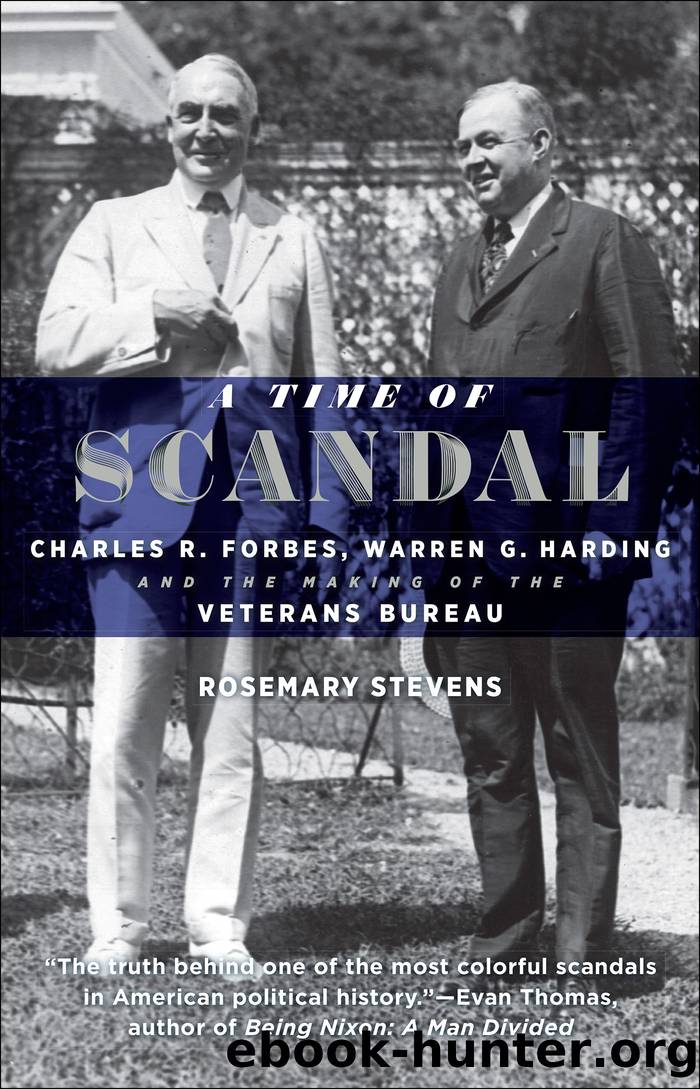A Time of Scandal by Rosemary Stevens

Author:Rosemary Stevens
Language: eng
Format: epub
Publisher: Johns Hopkins University Press
Published: 2016-08-14T16:00:00+00:00
Having begun work in the spring of 1923, the Senate investigation of the Veterans Bureau had a head start over other purported scandals of the Harding administration. By the time of Harding’s death, O’Ryan’s staff had amassed a library of information about “the troubles in the Veterans’ Bureau,” as he saw them, and reforms in the bureau were well under way under General Hines. The three committee members, Senators David Walsh, David Reed, and Tasker Oddie, had been committed to the cause of reform from the start. The evidence produced by their strong investigating team suggested, further, that there had been administrative malfeasance and possible crime in the bureau during the Harding administration.
Each of the senators blamed Forbes without meeting with him. The situation seemed self-evident. Forbes had run the bureau; the bureau had problems; the director was at fault. The force in setting up the investigation, Democrat David Ignatius Walsh, was an energetic, able, outspoken, public-spirited lawyer of Irish heritage and Jesuit education who was a champion of labor, committed to helping the poor and oppressed, and a seasoned politician with progressive views. He had served as lieutenant governor and then governor of Massachusetts. (He was the forty-eighth governor of that state, Coolidge the fiftieth.) Walsh had been in the US Senate since 1919 and remained there through World War II. He dedicated himself to the needs of war veterans, particularly those in New England, who were served by the bureau’s fractious Boston office during Forbes’s tenure and was exasperated with continuing deficiencies in service.8
The committee chair, David Aiken Reed, Republican, had served in the World War as a major in the Seventy-Ninth Division, 311th Field Artillery, held the Distinguished Service Medal, and was a member of the American Legion. Reed had chaired the influential Pennsylvania Industrial Accidents Commission for five years before the war, while practicing law. (He was appointed to the Senate in August 1922 to fill the seat of Republican Senator William E. Crow after Crow’s death.) Reed graduated from Princeton and the University of Pittsburgh School of Law and joined a Pittsburgh law firm that was the successor to the one founded by his father, Judge James Hay Reed, which had long served the Mellon interests. Not surprisingly, Senator Reed was a close associate of Treasury Secretary Andrew W. Mellon, an influential cabinet member in both the Harding and the Coolidge administrations. The senior senator from Pennsylvania, George Wharton Pepper, wrote of Dave Reed that his mind was “the most alert I have ever seen in action.” He collected rare books and manuscripts, had a special interest in the history of printing, was a skilled marksman, and played the mandolin. Chairing the Veterans Bureau investigation provided him with an early, visible chance for leadership. (A second chance was soon to come. His name appears on the restrictive Johnson-Reed Act of 1924, which established strict national quotas to control the mix of immigrants, with a very strong bias toward northern Europeans.)9
The third member of the committee,
Download
This site does not store any files on its server. We only index and link to content provided by other sites. Please contact the content providers to delete copyright contents if any and email us, we'll remove relevant links or contents immediately.
| Africa | Americas |
| Arctic & Antarctica | Asia |
| Australia & Oceania | Europe |
| Middle East | Russia |
| United States | World |
| Ancient Civilizations | Military |
| Historical Study & Educational Resources |
Cat's cradle by Kurt Vonnegut(13868)
Pimp by Iceberg Slim(12933)
Underground: A Human History of the Worlds Beneath Our Feet by Will Hunt(11258)
4 3 2 1: A Novel by Paul Auster(11052)
The Radium Girls by Kate Moore(10908)
American History Stories, Volume III (Yesterday's Classics) by Pratt Mara L(4827)
Perfect Rhythm by Jae(4621)
Wiseguy by Nicholas Pileggi(4586)
The Fire Next Time by James Baldwin(4343)
Paper Towns by Green John(4169)
A Higher Loyalty: Truth, Lies, and Leadership by James Comey(4033)
Pale Blue Dot by Carl Sagan(4003)
The Mayflower and the Pilgrims' New World by Nathaniel Philbrick(3915)
The Doomsday Machine by Daniel Ellsberg(3732)
Too Much and Not the Mood by Durga Chew-Bose(3696)
Killers of the Flower Moon: The Osage Murders and the Birth of the FBI by David Grann(3609)
The Borden Murders by Sarah Miller(3590)
The Sympathizer by Viet Thanh Nguyen(3483)
Killing England by Bill O'Reilly(3455)
